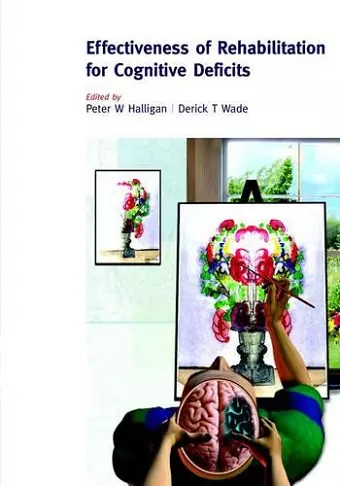The Effectiveness of Rehabilitation for Cognitive Deficits
Peter W Halligan editor Derick T Wade editor
Format:Paperback
Publisher:Oxford University Press
Published:29th Sep '05
Currently unavailable, and unfortunately no date known when it will be back

Many patients with brain damage are left with a range of neuropsychological deficits that impair normal cognitive process. It is generally recognised that these less obvious cognitive deficits (including memory, language, perception, attention and executive disorders) militate against full recovery often to a greater extent than more traditional medical deficits (e.g. paralysis, sensory loss, etc). Recognition of this has helped fuel the exponential growth in cognitive neuropsychology and neuroscience over the past 30 years. In turn, this theoretical approach has been used to guide and inform the development of cognitive therapies designed to remediate cognitive impairments and their functional consequences. Cognitive rehabilitation has over the last decade grown to become an established and influential therapeutic approach. There is now a considerable body of knowledge describing the principles and theoretical basis for analysing and directing treatments to selective cognitive deficits. Despite this, the clinical effectiveness and extent to which cognitive theory can inform therapeutic treatment has been questioned. It is timely, therefore, to evaluate and discuss the type and quality of evidence used in support of cognitive rehabilitation. In this book, some of the most influential clinicians and cognitive neuroscientists in the world critically review and discuss the effectiveness of rehabilitation methods currently used to treat patients with cognitive impairments following acquired brain damage. It provides a much needed critique and consensus about what should constitute best practice. The book will be valuable for all those who have to deal with the neuropsychological and neurological effects of brain damage, including, neuropsychologists, neuropsychiatrists, neurologists, experimental pscyhologists, and neuroscientists.
This is an excellent book on cognitive rehabilitation, providing a critical analysis of these treatments in a balanced and relatively unbiased manner. The authors are leading scientists and clinicians in the field and their expertise comes across in their precise and thoughtful chapters. This is probably the most comprehensive review on effectiveness of rehabilitation for cognitive deficits available and definitely worth owning for professionals and students alike. * Doody's Journal *
ISBN: 9780198526544
Dimensions: 240mm x 168mm x 24mm
Weight: 733g
414 pages